by Sunisa Jamwiset Deiters (Om)
Preface: Partnerships for Community Development (PCD) has been using "ecocentrism" as the guiding principle for its work, holding the core belief that nature is an organism in which all living beings are interdependent. Such belief is epitomised in the ecological philosophy of "Deep Ecology" created by the Norwegian philosopher Arne Naess. Thanks to him, all kinds of experiential learning activities guided by deep ecology have been carried out around the world by many people – one of them being Sunisa Jamwiset Deiters (Om), a facilitator from Thailand who designs workshops that re-establish connection between human and nature. Since 2018, PCD has been supporting partners to participate in Om’s Deep Ecology workshops at home and abroad. Feedback from participants generally agreed that the workshops helped them in re-connecting their inner self with nature and inspired them to add another dimension to the ecological perspective. Affected by the current epidemic in the past year, we have not been able to invite Om to come to China. Yet Om would like to share with us her journey of exploration and her hopes for Chinese partners in form of words. Hopefully, we will be able to draw strength and inspiration from her sharing.
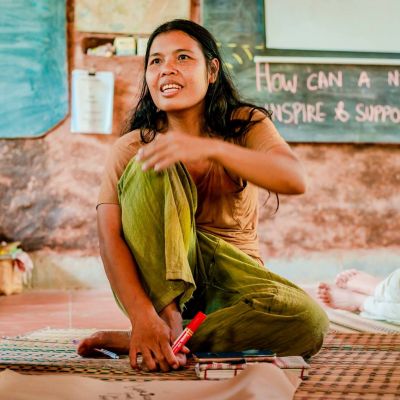
Looking back at my journey of Change, I observe that my focus was going back and forth between personal change and social change. Until recently, I started to see they come together as one.
In my very early years between the age of 10-18, I was mainly focused on social change. My interest in society came quite early, when I was 10 years old. It happened when I observed changes happening in my village. I held a lot of questions and doubts about why those changes needed to happen. I lived in a small village in a remote area. Our village was a bit away from other surrounding villages and the road to access our village wasn’t that good. We were quite isolated. As a child I didn’t have much idea of the outside world. All I knew was just what we do each day and everything seemed fine and great to me. I, as a kid, didn’t feel that we lacked anything and that change needed to happen. But one day changes started to happen. Something called development was coming to our village. The road in the middle of the village where every night in cold season we used to practice dance with the elders and play with each other started to be transformed into a cement road; soon after electricity, TV, machines started to follow.
As a young girl I was questioning why all these needed to happen. I didn’t hear anyone complain about the way things were before, so who decided to make the changes and how to change? And why?
My interest as a young girl was going toward social change. The questions I had in my head led me to study “Community Development” in the faculty of Humanity and Social Science in my University. I had the impression that politicians were the one who decided what, how and why to change our community and our society because that stated in their campaign. Because of this impression I decided to study “Community Development” in university. I thought that studying this would make me the right person to be selected as a congress member of my province. I wanted to be a politician because I wanted to be the one who decided what, how and why to change our community and society.
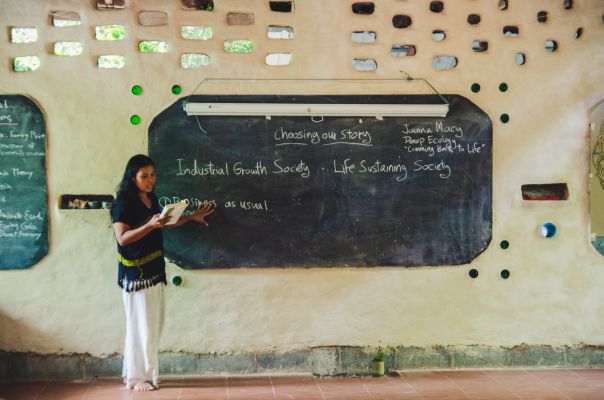
However, my teachers in the university helped me understand that there are other factors like the corporates, the international institutes and multi governmental organisations that are behind most changes in our society. I felt helpless when I learned that. I felt small and meaningless. I am nobody. Even if I tried so hard to become a successful politician I would probably only be a small part in the big game played by the big guys, big institutes. Realising this, my interest in social change was wiped out and my interest in personal change began. I felt helpless, disappointed, disempowering and depressed when I learned about social structures and how changes and development is designed by only a few powerful people and institutes in the world. Thanks to all these despair feelings it forced me to question my life and my existence.
“If I am not here on earth to be part of it, why am I here then?”
I took adventurous ways to discover the “edges”, thinking that if I stand at the edge between life and death I might realise the meaning of life. Several ‘close to the edge’ experiences didn’t show me the meaning of life but it showed me the mystery of life instead. The closer I got to the edge the farther away the edge moved, the more possibility of life was revealed. There are things beyond the known. The unknown is giant and immense. Life is no longer meaningless, there is so much more to discover. These experiences gave me hope and trust in life. There must be something beautiful and graceful about our human existence on earth. It is hidden in the mystery. I trusted and had faith in my insights. So I started the search internally.
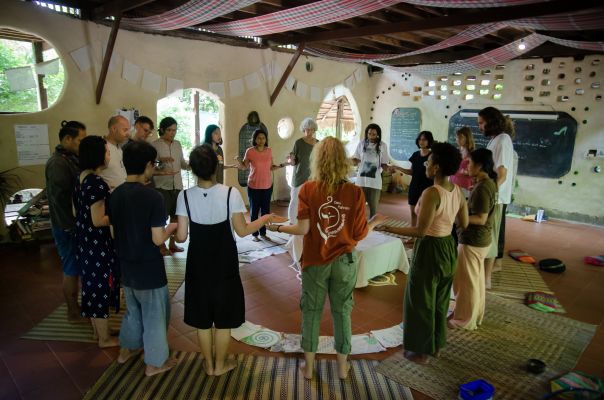
However, I believe that those who work for social changes are the one who I am going to learn from. Because they are the one who already realized something. It must be a deep realization that has brought them to commit to engage in social change. It must be a deep realisation that has brought people to commit themselves as activists. So I set my intention to travel to visit and volunteer at different NGOs.
I started at Wongsanit Ashram. When I showed up there in 2004 and introduced myself “I am a traveler. I am here to learn and I can do whatever you want me to do”, they didn’t seem surprised and simply showed me where to stay and what to do.
My eight years at Wongsanit Ashram is not just a big milestone of my life. It is like a mountain of life. In my first few years at Wongsanit Ashram, my focus was diving deep into personal growth. Here I learned meditation for the first time. Right at the first time I sat and meditated, I felt a deep sense of peace I had never experienced before. Especially during that time my mind is full of confusions, doubts and despair. More than peace it gave me a stronger insight that life is mysterious and I had only been experiencing a very tiny bit of it.
_0.jpg)
Apart from meditation I learned through many processes and activities there. I am forever grateful for my teacher PrachaHutanuwatra, Jane Rasbash, my mentors and friends at Wongsanit Ashram. I felt very safe and had enough freedom to learn and explore life in my own way. During those first few years at Wongsanit Ashram that I focused so much on personal growth I, however, worked on social change projects as well. But I refused to call myself an activist in those years. I didn’t see myself as an activist because I did all those works out of my faith in my community that those were good work for good deeds. I did it out of the faith in a Budhist teaching on the Eightfold Path of personal transformation and that we need to have ‘right livelihood’. So I worked in social change because it is part of my personal growth. I prioritized personal growth.
It was later when I started to dive deep into Deep Ecology philosophy and deepen my experience with it that I started to realize personal change and social change is really just one. Deep Ecology, especially described by Stephan Harding on the three components ; deep questioning, deep experience and deep commitment emerges Deep Ecology. It made me understand myself in my early age where I questioned a lot and how all those questions had led me on a journey to find deeper meaning of my existence which became the core of my commitment to stand with life. Learning on the Deep Ecology path, I started to see that personal growth and social change are not two separate parts. They are one.
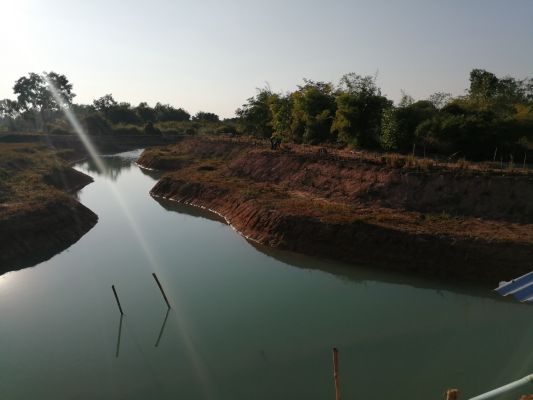
The sense of oneness between the individual self and the greater self is strength. This oneness that I experience and understand it’s not that I lose myself as an individual to become one with all. I feel even more rooted in the uniqueness of my individual self as I see how important it is to play my part in the greater whole. When I experience this sense of oneness I feel proud of my existence as it feels I really belong here. I am needed here and I’m meant to be here on this Earth. I am here with life and I am going to stand with it no matter what. Because I am part of this living system called Earth. This is the force of my actions for social change.
Realising that I am part of the greater whole and greater whole means the interconnectedness of all I then know I have to work in collaboration with others. I have to be open-minded and tolerant. I feel grateful and deeply appreciate that the others do their parts. I offer what I can best offer and am not shy to ask for support when needed. That's how the whole could work.
Founding of Gaia Ashram
When I felt deeply grounded in the Deep Ecology path, knowing that this is my spirit and who I am, I then felt ready to manifest that spirit in day to day living. Myself and my partner Tom Deiters share the same spirit. We then found Gaia Ashram in 2014 with the intention to create a culture that is based in Deep Ecology philosophy and use the Ecovillage Design guidelines and Permaculture to design the project holistically. Gaia Ashram is a learning center where we offer education that helps people to find deeper connections with the Earth, to ask the questions of who we are and what is our part on this earth. These questions will inspire us to be committed to be part of the self-healing or self-regenerating process of the earth. Our education programs include the learning of the head-heart-hands, community living and culture.
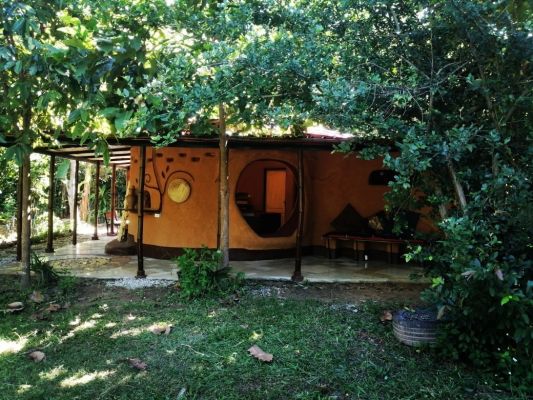
We believe that education plays an important role in social change. Because change needs to take place in the consciousness as well as in other aspects such as social structures. We believe that it takes a holistic approach to educate or transform the consciousness for a paradigm shift towards a more just and loving world. As a part of educational programs designed for this transformation, we believe culture is a powerful education in a community or society. Individuals are educated through the ways, traditions or culture of their society, or the community they live in. Children, if not being influenced by the culture from outside, they would naturally learn the way of life, the values, worldview and practices of their community even if it is not taught in school.
Gaia Ashram then tries to create a culture rooted in deep ecology worldviews. We trust that people who come to stay at Gaia Ashram would learn from our way of living here, same as the children who are growing up here. A culture can not be created from a superficial level. It manifests from the depth of our spirit. Practices to deepen our connection with the earth are designed to be part of our day to day living at Gaia Ashram.
My view on the potential of the Deep Ecology movement in China
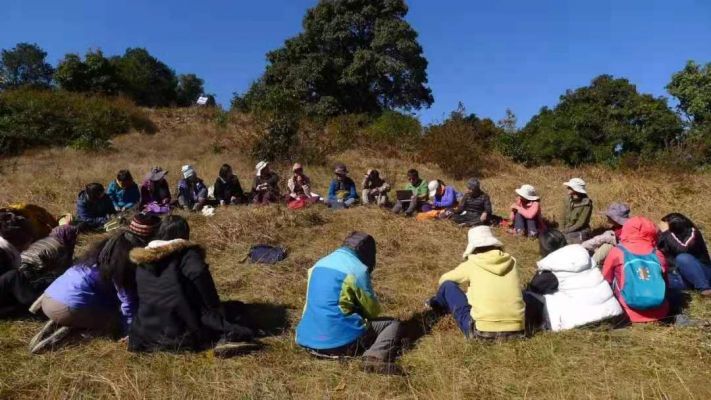
I have got the opportunities to facilitate Deep Ecology workshops for Chinese groups both inside China and outside of China. Honestly I always enjoy working with the groups. There are several reasons; one is that these groups were always keen to go deep in the philosophy as well as the experiential part of it. Sometimes I think Deep Ecology is more popular in the experiential aspect of it. With the Chinese groups I felt that they were also very much interested in the philosophical aspect of it. I really believe that activists who want to use deep ecology as the force of their action need to go deep in philosophy, not only the experiential part that gives us good feelings. However, I also observe that people also need more experiential processes. I observe a lot of feelings and pain people are carrying to the workshops. People are ready to process their feelings with proper instructions. When both experiential learning and philosophical learning come together our spirit will root more deeply into it. That gives us the strength to lead the movement. Seeing how educators, social workers and younger generation in China gaining interest for Deep ecology and are keen on both philosophical learning and experiential learning, plus the cultural root that has the essense of Deep Ecology worldview, I have hope that Deep Ecology can become a movement in China especially in reconnecting and regenerating a culture and practices based in holistic, interconnectedness worldview.

